On the Calendar
WPEA is thrilled by the overwhelming response to our raffle event running from March 20th to April 30th! Hundreds of members have already updated their contact details to earn entries for a chance to win amazing prizes like AirPods 3, Fitbit Charge 6, or a $100 gift card. The anticipation is building as we prepare to announce the three lucky winners during the UNITY meeting this Wednesday at 12 PM. We can't wait to celebrate our members' enthusiasm! Message From the President From the desk of WPEA President Amanda Hacker WPEA is going into bargaining for our 2025-2027 contract. Bargaining will start in May and conclude in September when we reach a tentatively agreed to contract. This round of bargaining is critical for our members. Classified staff continue to fall further and further behind their counterparts in private sector, our benefits continue to be eroded and our work/life balance is not sufficient for the salary we receive. The only way to stop the downward trend in salary and benefits for classified staff is to stand together, in solidarity, and expect better from the State. WPEA’s bargaining teams are getting ready to negotiate a contract that will cover the 2025-2027 biennium. Our ability to negotiate a fair and appropriate contract depends on our ability to engage our membership and show power and leverage at the bargaining table. WPEA’s membership numbers have taken a hit since the Janus vs. AFSCME decision in 2018. We simply will not be able to bargain a fair contract for our members without more involvement and engagement at the membership level. To that end, WPEA is partnering with our International Union, United Food and Commercial Workers (UFCW), to visit your local worksite and talk to members about the importance of signing up as a member of our Union. On April 16th WPEA welcomed Steve Sloniker back as our Contract Administration Director (CAD). Steve worked for WPEA as a Staff Representative from 2011 – 2018. We are excited to welcome Steve back in this important role. Our CAD is the supervisor for the Rep Staff and the director for all contract enforcement at WPEA. In addition, Steve will be the lead negotiator on our statewide contracts this year. We are still looking for volunteers for the following bargaining units to participate in negotiations: Liquor and Cannabis Board Department of Licensing Wenatchee Valley College Tacoma College If you are in one of these bargaining units and want to volunteer to be the representative at the table, please contact Steve directly at steve@wpea.org. New Leadership - New Faces of WPEA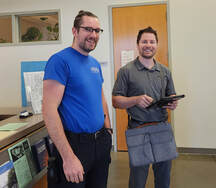 WPEA Organizer Joey Hicklin (left) and UFCW Organizer Sergei Larson (right) WPEA Organizer Joey Hicklin (left) and UFCW Organizer Sergei Larson (right) We are thrilled to introduce: Joey Hicklin, WPEA Organizer and IT Administrator! Joey’s journey into the labor movement began with a personal experience that resonates with many of us. During their early years at Clark College, Joey was initially unaware of the Union’s presence. However, a significant shift in his job role brought to light the importance of understanding his rights under the Union contract. Despite encountering initial frustration due to a lack of support, Joey was determined to turn this experience into an opportunity for change. He became a steward with the goal of ensuring that no one else faced similar challenges alone. In his current roles as both an Organizer and IT Administrator, Joey has set ambitious goals aimed at empowerment and efficiency. His dedication to creating training content for members reflects a commitment to equipping individuals with the knowledge and tools to advocate for their rights effectively. Additionally, Joey's technical expertise is evident in their goal to streamline IT processes thus ensuring seamless access and support for all staff, regardless of location. For those aspiring to follow a similar path, Joey offers sage advice: never stop learning and get involved. Learn something new every day and get involved. Read your Collective Bargaining Agreement (CBA), explore the Washington Administrative Code (WAC) and the Revised Code of Washington (RCW), and learn about the Fair Labor Standards Act (FLSA). Get involved with your local union leadership, ask questions, and bring your voice to the discussion. "We are building the future every day in what we accept, what we demand, and what we create. The canvas is still very blank, and personally, I'm excited every day to contribute to the conversation on deciding what color to lay down next." - Joey Outside of work, Joey enjoys designing board games and is also a "prepper". He has been playing video games since the age of 3, was ranked 38 in Halo 2 back in the day, and today prefers to play RPGs on the easiest difficulty, just to relax. Joey and his wife and their 2 kids (ages 3 and 5) love to go on hikes, explore the outdoors, and build kids projects at Home Depot and Lowe's, and do all the things that our active and wild toddlers are drawn to do. We are thrilled to welcome Joey to our team and look forward to the positive impact he will undoubtedly make. Joey is building training content every week, which he presents at our UNITY meetings. UNITY meetings are held every Wednesday at 12 and 5. If you don't get those invites, please update your contact info at: Update If you would like to access any training content from previous weeks, you can find that at: Training  Welcome back: Steve Sloniker, WPEA Contract Administration Director! If you have been around WPEA for awhile, Steve may be a familiar face. Formerly a Staff Representative, he has returned as our Contract Administration Director, filling the role Amanda vacated after her election to President. Steve's journey into the labor movement is rooted in a desire for justice and empowerment. Having experienced firsthand the disregard for employees' value and dignity. In a previous workplace, Steve recognized the vital role organized labor plays in amplifying the voices of workers and demanding accountability from management. The collective bargaining agreement emerged as a powerful tool to level the playing field, that empowered Steve and his colleagues to advocate for fair treatment and improved conditions. In his current role, Steve is driven by a clear goal: to negotiate strong contracts that elevate the well-being of our members. Steve is excited to spearhead the negotiation of Higher Ed and General Government contracts. By striving for improved working conditions and equitable compensation, he aims to create meaningful change that benefits the entire membership. Steve offers valuable advice to anyone looking to get involved: embrace curiosity, seek out opportunities for involvement, and empower yourself with knowledge. By actively engaging in member meetings, understanding your rights under the collective bargaining agreement, and building relationships with staff representatives, you can become a catalyst for positive change. In the words of Benjamin Franklin "Lost time is never found again;" so in Steve's off-time he finds joy in spending time with family and relaxing. Welcome back to WPEA, Steve! Cheers to New Adventures: Saying Goodbye to Mike & Mark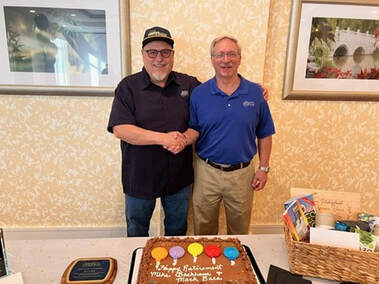 Mark Baca (Left) and Mike Backhaus (right) at their retirement ceremony April 20, 2024 Mark Baca (Left) and Mike Backhaus (right) at their retirement ceremony April 20, 2024 Mike Backhaus, WPEA Business Manager, started at WPEA in September of 2000, had a 6 year break, and came back to WPEA until May of this year. When asked what he plans on doing in retirement he said, “Have Fun!” He also plans to work with the local Veterans group, visit family and enjoy time with his grandson. “I’m a 1G guy living in a 5G world” - Mike Backhaus Mark Baca, retired from Dept. of Revenue earlier this year and has been very involved with WPEA since 1998. He started as a Shop Steward, Chapter President, a Board Member, and Secretary-Treasurer for WPEA for many years, as well as on the WPEA Building Association. Mark will be part of WPEA as the on-call building maintenance manager so you may see him around. Mike and Mark have been a great assets to WPEA and will be greatly missed! Honoring Jim Crabb - 25 Years of Service
LEARN - The Grievance Process |
| Recurring Events: President Office Hours – Every Monday at 12:00 and Thursday at 4:00 Stay up-to-date with your WPEA President Join Zoom Meeting https://us06web.zoom.us/j/84804444204?pwd=8WO6oSWkNIEyIBc4bAblg2im01Jkb4.1 Meeting ID: 848 0444 4204 Passcode: 424576 UNITY Meetings – Every Wednesday at 12:00 & 5:00 Different topics, highlights, and news from your Union every week Join Zoom Meeting https://us06web.zoom.us/j/81922699344?pwd=dbfzaAvNpLkL4UOGhuS2oseCB3bZiD.1 Meeting ID: 819 2269 9344 Passcode: 716299 Thurston-Lewis-Mason Central Labor Council Solidarity Night & Meeting – 1st & 3rd Wednesday of every month. Stay up-to-date with the latest from the Central Labor Council and visit their website at: https://www.tlmlabor.org/ | April Events WPEA Statewide Steward Meeting – April 2nd - 6:00-7:30pm Join Zoom Meeting https://wpea-org.zoom.us/j/88632201394?pwd=bkesc1vAAC1bB3BLbYl4oQBL5LCndk.1 Meeting ID: 886 3220 1394 Passcode: 844161 WPEA Board Meeting – April 20th from 9:00-4:00 – All Members are welcome to attend. This meeting will be held at the Hilton Garden Inn in Olympia. Members may attend via Zoom, a link will be sent via email as the date gets closer. Shop Steward Training – April 26th from 9:00-12:00 – Abbie Hart will be hosting the April Shop Steward Training, if you wish to attend please reach out to abbie@wpea.org to RSVP and you can attend via the zoom link. Join Zoom Meeting https://wpea-org.zoom.us/j/82057355538 Meeting ID: 820 5735 5538 Deadline for WPEA Scholarship – April 30th – Only emailed applications will be accepted. Questions? Please call 1-800-544-9732 or visit our Scholarship Page. WPEA Raffle – Last Day to Enter! – April 30th – Don’t forget to update your contact information with us and be entered to win. Prizes include:
|
Message From the President
From the desk of WPEA President Amanda Hacker
WPEA’s new Executive Board started their term on January 1, 2024. When the new Board assumed office earlier this year, we assessed our membership numbers and were alarmed to see that our across-the-board percentage was at 49.2%. While we knew coming into this term that membership numbers would need to be a priority, we were still surprised at the severity of the problem. Since then, we have had to prioritize organizing and membership sign up to build power and leverage as we go into bargaining this year. Part of our plan to address this issue includes support and guidance from our International Union, UFCW.
On April 22, 2024, WPEA and UFCW will kick off a membership drive that will extend through May and June of this year. During this time, WPEA and UFCW staff will be visiting worksites more frequently and discussing the benefits of the Union with members who have opted not to join us. With the supreme court decision, Janus, that left all public sector Unions without the option that private sector Union’s have: Union Security or “closed shop” bargaining units. This has created a situation where we are essentially in a “right-to-work” environment and will need to prioritize organizing and new member sign ups going forward for that reason.
Our membership drive is critical to our ability to bargain and administer a contract that our members want and deserve. WPEA’s state contracts are bargained during even years and our contracts go into effect on July 1st of odd years. This means that 2024 is a bargaining year for us. We will be going to the table for all our state contracts in May and June of this year. Going into bargaining when you have less than 50% of represented staff paying dues and actively supporting their Union does not give the bargaining teams a lot of power or leverage to work with at the table. This is especially difficult at a time that our members are falling further and further behind prevailing wage. Members who have worked for the state for 20 years make approximately 26% less today than they did 20 years ago – this is due to inflation and the COLAs not keeping up with that inflation. The state already expects that employees will make less than prevailing wage – when you add that to the loss in income over the last 20 years, it results in multiple members living at poverty level and relying on government assistance for basic needs. This trend of falling further behind every two years is unacceptable and is negatively impacting our members’ quality of life.
To turn this around, we will need an active and strong Union, which comes from an active and strong membership.
Please consider getting involved in bargaining by:
On April 22, 2024, WPEA and UFCW will kick off a membership drive that will extend through May and June of this year. During this time, WPEA and UFCW staff will be visiting worksites more frequently and discussing the benefits of the Union with members who have opted not to join us. With the supreme court decision, Janus, that left all public sector Unions without the option that private sector Union’s have: Union Security or “closed shop” bargaining units. This has created a situation where we are essentially in a “right-to-work” environment and will need to prioritize organizing and new member sign ups going forward for that reason.
Our membership drive is critical to our ability to bargain and administer a contract that our members want and deserve. WPEA’s state contracts are bargained during even years and our contracts go into effect on July 1st of odd years. This means that 2024 is a bargaining year for us. We will be going to the table for all our state contracts in May and June of this year. Going into bargaining when you have less than 50% of represented staff paying dues and actively supporting their Union does not give the bargaining teams a lot of power or leverage to work with at the table. This is especially difficult at a time that our members are falling further and further behind prevailing wage. Members who have worked for the state for 20 years make approximately 26% less today than they did 20 years ago – this is due to inflation and the COLAs not keeping up with that inflation. The state already expects that employees will make less than prevailing wage – when you add that to the loss in income over the last 20 years, it results in multiple members living at poverty level and relying on government assistance for basic needs. This trend of falling further behind every two years is unacceptable and is negatively impacting our members’ quality of life.
To turn this around, we will need an active and strong Union, which comes from an active and strong membership.
Please consider getting involved in bargaining by:
- Attending our UNITY meetings every Wednesday at noon and 5:00 pm
- Updating your contact information with the Union to assure that we have both your personal email address and your cell phone number – we want to be able to communicate effectively and in a timely manner while we are bargaining – if we don’t have up-to-date contact information, we cannot effectively do that.
- Contacting solidarity@wpea.org and requesting a WPEA button to wear at work.
- Providing proposals for the bargaining teams to take forward to management.
- Encouraging your coworkers and peers to assure that they are signed up as a WPEA member and that we have their accurate contact information.
Statewide Contract Cycle - Where are We?
Update from Julia Thurman-Lascurain, WPEA Member Education & Mobilization Director
To strengthen collective bargaining power and ensure fair treatment in the workplace, WPEA is rallying members to actively participate in contract negotiations. This call to action comes amidst a backdrop of rising concerns over worker rights and equitable treatment across all agencies and institutions.
With negotiations fast approaching between labor unions and management representatives, leaders emphasize the pivotal role of member involvement in shaping the terms of the contracts. In recent meetings and communications, union officials have urged members to actively engage in the bargaining process, emphasizing the importance of solidarity and collective action in achieving favorable outcomes.
"Union strength lies in the active participation of its members," remarked President Amanda Hacker, "Our ability to negotiate fair wages, benefits, and working conditions hinges on the unity and involvement of every member."
Building upon this sentiment, union leaders are initiating various outreach efforts to encourage member participation. From online raffles and weekly Union Networking, Information, and Trainings for You (UNITY) meetings, to online bargaining language forms, avenues for open dialogue and feedback are being established to ensure that the bargaining priorities truly reflect the needs and concerns of the workforce.
"We are not just negotiating contracts; we are shaping our collective future," stated Seamus Petrie, the WPEA lobbyist. "Every voice matters, and by standing together, we can secure better working conditions and protections for all."
The push for member involvement in contract bargaining is not merely about securing immediate gains but also about fostering a culture of empowerment and solidarity within the labor movement. By actively engaging in the negotiation process, workers are not only advocating for their own rights but also strengthening the broader labor movement for generations to come.
As negotiations progress, union leaders remain steadfast in their commitment to amplifying the voices of their members and advocating for equitable treatment in the workplace. The call for member involvement serves as a potent reminder that true power lies in unity, and together, workers can achieve transformative change in their workplaces and communities.
With negotiations fast approaching between labor unions and management representatives, leaders emphasize the pivotal role of member involvement in shaping the terms of the contracts. In recent meetings and communications, union officials have urged members to actively engage in the bargaining process, emphasizing the importance of solidarity and collective action in achieving favorable outcomes.
"Union strength lies in the active participation of its members," remarked President Amanda Hacker, "Our ability to negotiate fair wages, benefits, and working conditions hinges on the unity and involvement of every member."
Building upon this sentiment, union leaders are initiating various outreach efforts to encourage member participation. From online raffles and weekly Union Networking, Information, and Trainings for You (UNITY) meetings, to online bargaining language forms, avenues for open dialogue and feedback are being established to ensure that the bargaining priorities truly reflect the needs and concerns of the workforce.
"We are not just negotiating contracts; we are shaping our collective future," stated Seamus Petrie, the WPEA lobbyist. "Every voice matters, and by standing together, we can secure better working conditions and protections for all."
The push for member involvement in contract bargaining is not merely about securing immediate gains but also about fostering a culture of empowerment and solidarity within the labor movement. By actively engaging in the negotiation process, workers are not only advocating for their own rights but also strengthening the broader labor movement for generations to come.
As negotiations progress, union leaders remain steadfast in their commitment to amplifying the voices of their members and advocating for equitable treatment in the workplace. The call for member involvement serves as a potent reminder that true power lies in unity, and together, workers can achieve transformative change in their workplaces and communities.
Community Helps Library Workers Get Living Wage
Article by Derya Ruggles, WPEA Organizing Specialist
| WPEA members at Fort Vancouver Regional Library are taking their fight public. In negotiations since summer of 2023, bargaining has stalled at wages. While FVRL’s new Executive Director has accepted nearly $200,000 in salary and administrators all make healthy 6-figure salaries, the rank-and-file library workers struggle for necessities. The loss of Steps for more than 10 years put workers further behind. 100% of workers polled reported they could not live without the assistance of family or government help. Derya Ruggles, who worked at FVRL for 13 years and is now a WPEA Organizing Specialist said, “I know that communities in Southwest Washington care about their library workers and would not tolerate this economic injustice if they knew it was happening. That’s why we are taking this struggle public and asking people to speak up alongside our workers to the FVRL Board in support of the dignity of a living wage for all library workers.” You can help! Show your solidarity with fellow WPEA workers and: Sign the petition- add your name to the 650 signers: https://www.change.org/p/it-s-time-fvrlibraries-pay-your-staff-a-living-wage Email FVRL Board of Trustees at: trustees@fvrl.org and say, “I support the dignity of a living wage for all library workers. Pay your workers fairly.” Read & listen More media coverage and info on the FVRL worker struggle: NW Labor Press: https://nwlaborpress.org/2024/03/low-paid-librarians-fed-up-in-vancouver/ The Stand: https://www.thestand.org/2024/02/take-action-raises-for-sw-washington-librarians-overdue/ (article #1) The Stand: FVRL Board: Pay your library workers livable wages! (thestand.org) (article #2-following struggle) K-BOO Radio Old Mole Hour coverage 3/25/24, 8-minute piece: https://kboo.fm/program/old-mole-variety-hour |
What are Mandatory Subjects?
Article by Joey Hicklin, WPEA Organizer
Did your job duties change? Did you get moved to a new office? Did the tools you regularly use get swapped out for something different? These are all examples of changes to your working conditions. Prior to implementing a change like this, your employer is required to submit a notice to the union. This is called a Mandatory Subject Notice, and it is usually delivered to your Staff Representative.
When we receive this notice, we will reach out to the affected member(s) to discuss any potential negative impacts. If negative impacts are identified, your Staff Representative files a Demand to Bargain, which then requires your employer to schedule time to discuss how to minimize any negative impacts. This process of notice and bargaining is a foundational element in ensuring that your working conditions do not become worse over time.
However, if your employer never delivers a Mandatory Subject Notice, then the entire process is undermined. Over the years, we have seen more and more employers fail to deliver these notices. When a lack of notice becomes common, it is up to the employees to report changes to their Staff Representative. This allows the Staff Representative not only the opportunity to be made aware of the change, but it also enables them to file a grievance against the employer for violating your contract by not providing the required notice.
Notice of these changes is vital, and with so many employers failing to provide the required notice, it is up to you to report these changes so we can correct that mistake. With each grievance, we move closer to your employer adhering to this this requirement for notice. If you don’t know who your Staff Representative is, check out our Contact Us page on our website and let them know of any changes at your worksite.
When we receive this notice, we will reach out to the affected member(s) to discuss any potential negative impacts. If negative impacts are identified, your Staff Representative files a Demand to Bargain, which then requires your employer to schedule time to discuss how to minimize any negative impacts. This process of notice and bargaining is a foundational element in ensuring that your working conditions do not become worse over time.
However, if your employer never delivers a Mandatory Subject Notice, then the entire process is undermined. Over the years, we have seen more and more employers fail to deliver these notices. When a lack of notice becomes common, it is up to the employees to report changes to their Staff Representative. This allows the Staff Representative not only the opportunity to be made aware of the change, but it also enables them to file a grievance against the employer for violating your contract by not providing the required notice.
Notice of these changes is vital, and with so many employers failing to provide the required notice, it is up to you to report these changes so we can correct that mistake. With each grievance, we move closer to your employer adhering to this this requirement for notice. If you don’t know who your Staff Representative is, check out our Contact Us page on our website and let them know of any changes at your worksite.
Dana Rollins: Dedicated Leader Serving Highline Community College and WPEA District 4
Article by Julia Thurman-Lascurain

Dana Rollins, Executive Board member and Vice President of District 4-King County, brings over two decades of experience and a profound dedication to his role at Highline Community College. With a career spanning 23 years at the institution, Rollins has not only demonstrated his commitment to education but has also emerged as a staunch advocate for workers' rights within the Washington Public Employees Association (WPEA).
Dana’s journey into union activism began around 2005 when he assumed the role of shop steward. Since then, his passion for solidarity and support for fellow members has only deepened. "Being part of the WPEA is more than just representation; it's about standing together and advocating for each other," Dana remarked, reflecting on his involvement in the union.
Beyond his professional endeavors, Dana harbors a profound affection for the Pacific Northwest, regarding it as the finest region he's ever resided in. This love for the locale underscores his commitment to serving his community and fellow workers. "It's an honor to serve on the board and lead District 4," Dana stated, highlighting the privilege he feels in his leadership role.
Throughout his tenure at Highline, Dana has gleaned invaluable lessons, with empathy and compassion emerging as guiding principles. "Try to have empathy and compassion, no matter how hard the situation might make it," he emphasized, underscoring the importance of understanding and support in navigating challenges.
As Dana continues to advocate for the rights and well-being of Highline's employees in his steward role, his leadership remains grounded in a genuine concern for the community he serves. Whether it's negotiating contracts or addressing workplace issues, Dana’s steadfast dedication to the principles of fairness and solidarity shines through.
Looking ahead, Dana remains committed to fostering a culture of inclusivity and support within District 4 - King County and the broader WPEA. Through his unwavering leadership and compassionate approach, Dana embodies the spirit of service and advocacy, leaving an indelible mark on Highline Community College and its workforce.
Dana’s journey into union activism began around 2005 when he assumed the role of shop steward. Since then, his passion for solidarity and support for fellow members has only deepened. "Being part of the WPEA is more than just representation; it's about standing together and advocating for each other," Dana remarked, reflecting on his involvement in the union.
Beyond his professional endeavors, Dana harbors a profound affection for the Pacific Northwest, regarding it as the finest region he's ever resided in. This love for the locale underscores his commitment to serving his community and fellow workers. "It's an honor to serve on the board and lead District 4," Dana stated, highlighting the privilege he feels in his leadership role.
Throughout his tenure at Highline, Dana has gleaned invaluable lessons, with empathy and compassion emerging as guiding principles. "Try to have empathy and compassion, no matter how hard the situation might make it," he emphasized, underscoring the importance of understanding and support in navigating challenges.
As Dana continues to advocate for the rights and well-being of Highline's employees in his steward role, his leadership remains grounded in a genuine concern for the community he serves. Whether it's negotiating contracts or addressing workplace issues, Dana’s steadfast dedication to the principles of fairness and solidarity shines through.
Looking ahead, Dana remains committed to fostering a culture of inclusivity and support within District 4 - King County and the broader WPEA. Through his unwavering leadership and compassionate approach, Dana embodies the spirit of service and advocacy, leaving an indelible mark on Highline Community College and its workforce.
History Matters: Yakima Valley College Students Meet Cesar Chavez & Become First in Union Organizing
Article by Derya Ruggles, WPEA Organizing Specialist and information for this article: https://www.historylink.org/File/7922
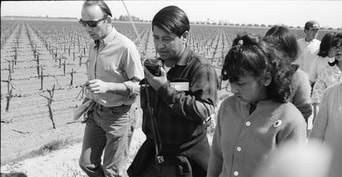 Credit: UC Merced César Chávez during the march from Delano to Sacramento in 1966.
Credit: UC Merced César Chávez during the march from Delano to Sacramento in 1966. During the1960s the rural population of Yakima County was economically among the lowest two-fifths of rural populations of all counties in the United States, with 39 percent of farm workers living below poverty level.
Inspired by the United Farm Workers Organizing Committee’s (UFWOC) grape boycott, two students from Yakima Valley College, Guadalupe Gamboa and Tomas Villanueva, friends who were both sons of Yakima Valley farm worker families, traveled down to Delano, California in 1966 to meet UFWOC leader Cesar Chavez (1927-1993). Upon returning, Gamboa and Villanueva co-founded the United Farm Worker’s
Cooperative (UFWC) in Toppenish, Washington.
The United Farm Worker's Cooperative is credited as being the first activist Chicano organization in the state of Washington. Progress for workers through the new union meant a successful cooperative was established and included services defending members when growers failed to pay wages or when workers got injured.
More on Guadalupe Gamboa: https://depts.washington.edu/civilr/gGamboa_interview.htm
Inspired by the United Farm Workers Organizing Committee’s (UFWOC) grape boycott, two students from Yakima Valley College, Guadalupe Gamboa and Tomas Villanueva, friends who were both sons of Yakima Valley farm worker families, traveled down to Delano, California in 1966 to meet UFWOC leader Cesar Chavez (1927-1993). Upon returning, Gamboa and Villanueva co-founded the United Farm Worker’s
Cooperative (UFWC) in Toppenish, Washington.
The United Farm Worker's Cooperative is credited as being the first activist Chicano organization in the state of Washington. Progress for workers through the new union meant a successful cooperative was established and included services defending members when growers failed to pay wages or when workers got injured.
More on Guadalupe Gamboa: https://depts.washington.edu/civilr/gGamboa_interview.htm
Newsletter Editor: Aubrei Franklin, Marketing & Membership Coordinator
Want a topic featured? Let us know at Solidarity@wpea.org
Want a topic featured? Let us know at Solidarity@wpea.org
Archives
Categories
Location |
|
Contact Us |

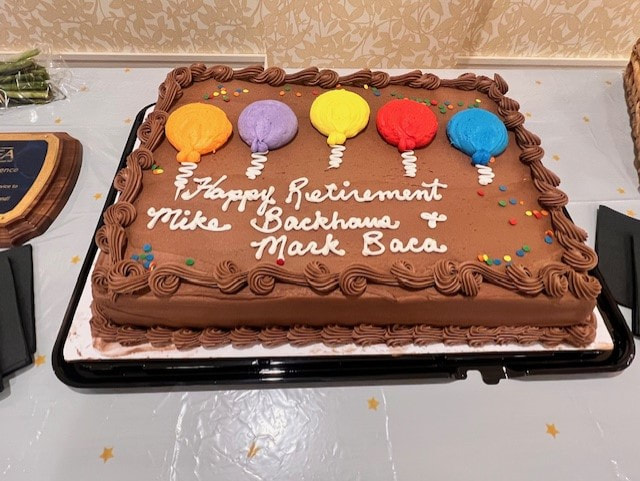
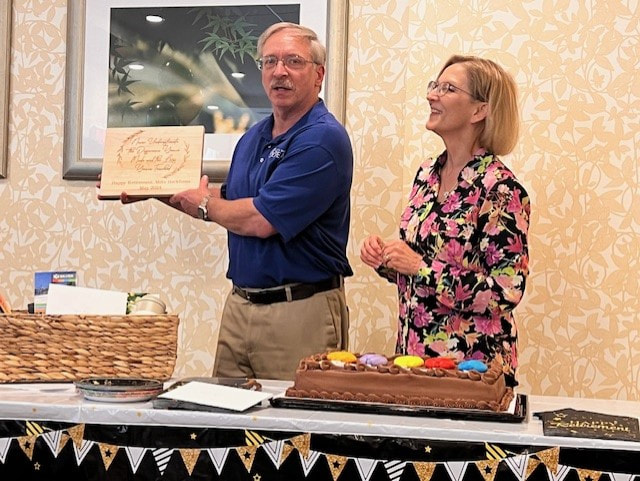
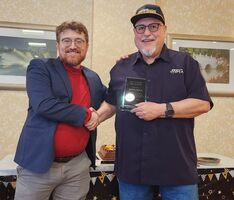
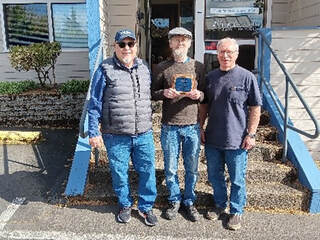



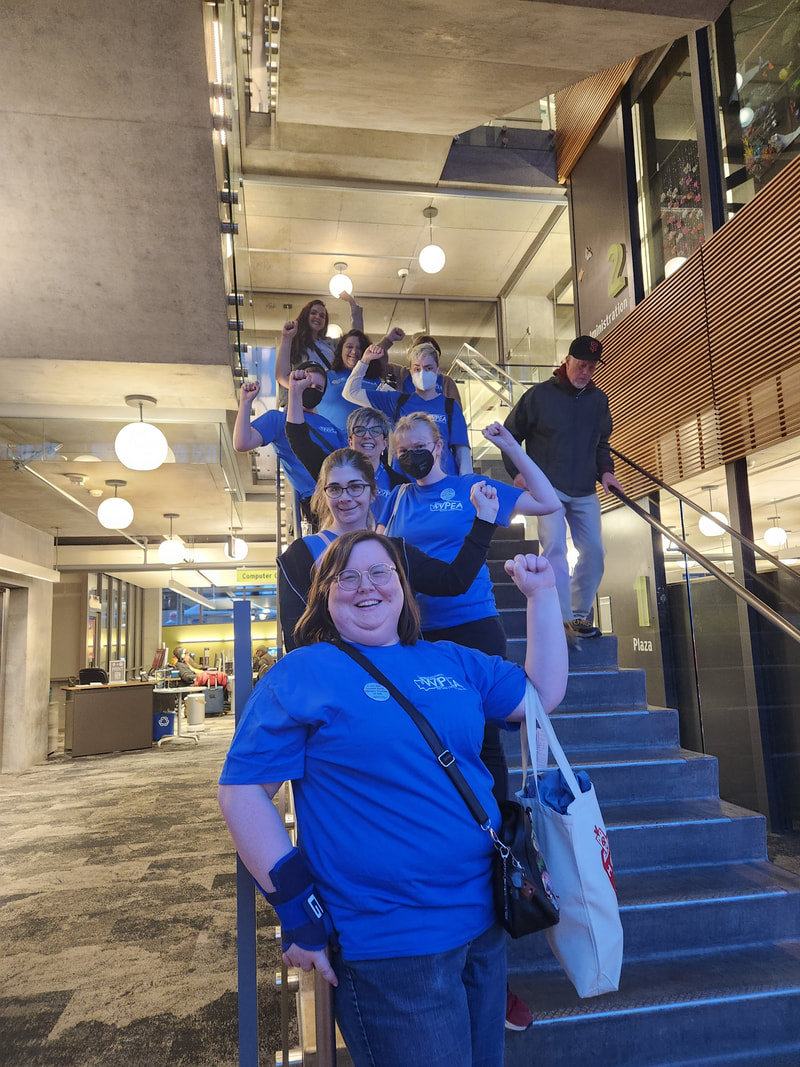
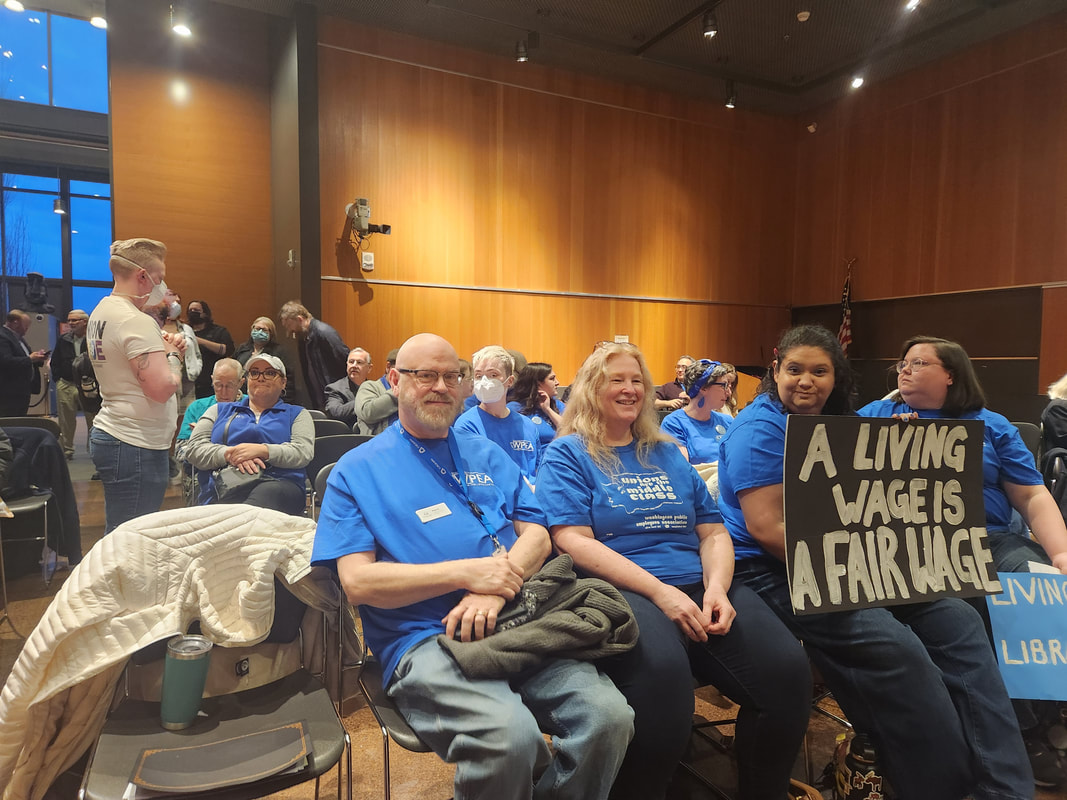
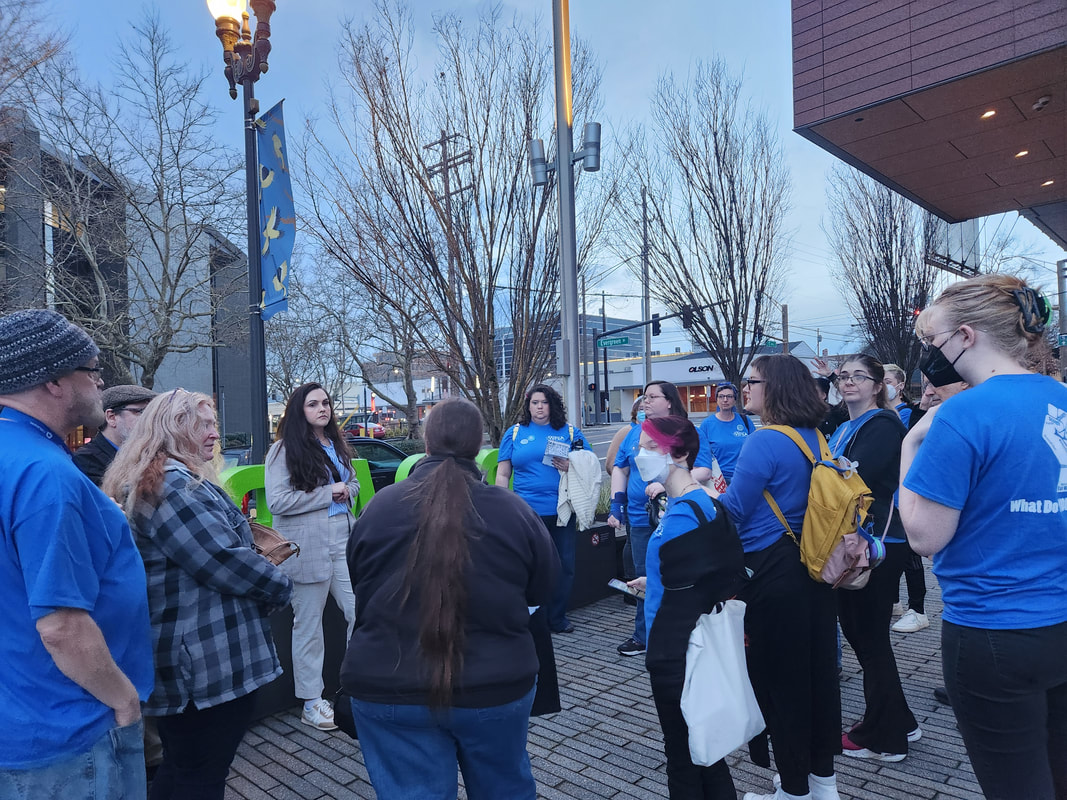
 RSS Feed
RSS Feed